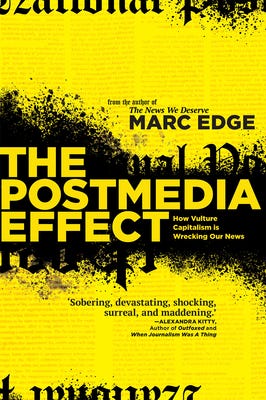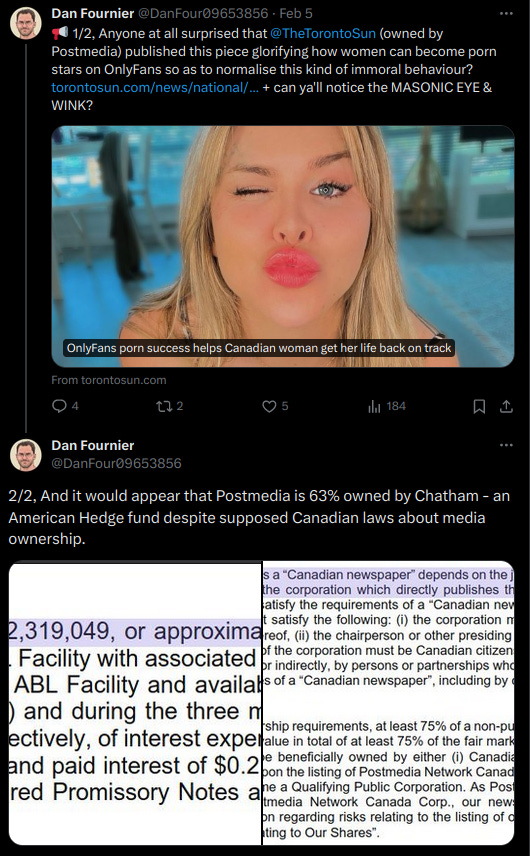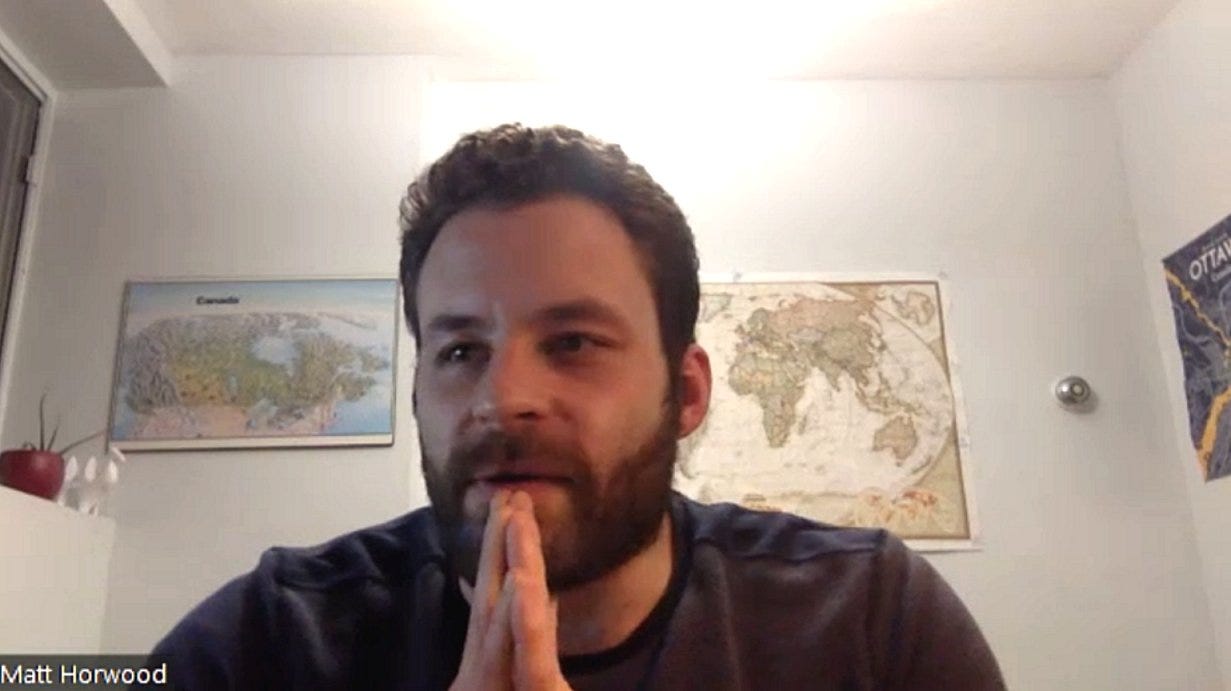Welcome to the eight episode of Dan Fournier’s Down the Rabbit Hole podcast.
Guests: Matthew Horwood.
In this podcast episode, I am honoured to be joined by Matthew Horwood who is currently an Ottawa-based reporter for The Epoch Times.
The interview provides a unique opportunity to get the perspective of a seasoned journalist who writes daily on a plethora of Canadian events and political figures. We also examine the state of journalism itself. Listen in on this fascinating conversation.
Disclaimer
Let it be understood that the views expressed by the guest are his own and do not necessarily reflect those of The Epoch Times or those of the host of this podcast.
ALTERNATE PODCAST LINK: listen on Spreaker or download the .mp3 for later listening.
Show Time Stamps
[00:00 to 00:55] Podcast intro.
[00:56 to 03:14] Welcoming Matthew Horwood, an overview of his background, including his early work as a writer and journalist.
[03:15 to 04:07] What he likes most about being a journalist. Digging for truth, and more.
[04:19 to 07:08] The current state of journalism in Canada compared to when he began his career. The corporatisation of media.
[07:09 to 09:37] What happened to the mainstream media during the Covid-19 Pandemic? Mainstream media narratives during the pandemic.
[09:38 to 12:21] The concept of face in China versus in Canada, including editorial decision making and politics.
[12:22 to 14:51] The News Gathering Process: here, I ask Matthew how he goes about choosing stories as a reporter for The Epoch Times.
[15:00 to 21:08] Here, I ask Matthew about the dangers of bill C-63, the ‘Online Harms Act’ and bill S-210. The bills entail a lot surrounding privacy, freedom of speech, censorship, how is “hate speech” defined, and so on. If the bills are to become law, how will they be applied?
[21:12 to 25:11] Which particular story or subject has shaken this journalist? Having been contacted by over 200 people who have been negatively impacted by the Covid-19 vaccines is central to his answer.
[25:12 to 26:36] Who takes the prize for the wackiest story of the past 12 months? Was it Justin Trudeau, Chrystia Freeland, or Steven Guilbeault?
[26:37 to 29:07] I ask Matthew about his Feb. 21’s tweet about Steven Guilbeault in which he stated: “The Transportation Committee unanimously passed a motion for Environment Minister Steven Guilbeault to appear as a witness within two weeks, following his controversial comments that the federal government would no longer invest in road infrastructure.”
[29:08 to 30:22] Would he be interested in writing Opinion pieces? If so, what topics would he like to write about?
[30:23 to 32:03] Who is Matthews favourite reporter at The Epoch Times and outside the outfit? Gary Webb who wrote about the CIA is one that he mentions and also Chris Hedges.
[32:04 to 32:49] Does he follow independent journalists/voices and media? If so, who?
[34:57 to 38:07] Here we talk about the Carlson-Putin interview and a Feb. 9 article (Trudeau Comments on Tucker Carlson’s Putin Interview, Decries ‘Propaganda’) he wrote about how Trudeau decried the event as propaganda. I also ask Matthew’s opinion about Tucker Carlson and whether he is as independent as he appears.
[38:08 to 41:59] The next Canadian federal election and who will be Canada’s next Prime Minister. Is the PM elected or selected?
[42:00 to 45:14] What is the biggest Rabbit Hole that Matthew has gone down. His advice on how to get away from all the madness.
[45:15 to 45:39] Were people can find Matthew Horwood’s work online.
[45:48 to 48:25] Outro (song) - White Rabbit by Grace Slick of Jefferson Airplane.
Show Notes
The Postmedia Effect
During our talk, I commented on and recommended a book called The Postmedia Effect: How Vulture Capitalism is Wrecking Our News by Marc Edge which details how the print and online media landscape in Canada has become highly corporatised and fragmented in recent years.
The book focuses largely on the Postmedia Network media conglomerate (which owns the National Post, Financial Post, the Toronto Sun, among many other outlets), hence the name of the book.
A synopsis for the book from GoodReads.com reads as follows:
“Even as their readers move on–line and their advertisers look elsewhere, daily newspapers continue to be our main source of information, shaping citizens' understanding of the world, and their reactions to events. At the same time, continuing a long–term trend in media ownership, newsrooms have been gutted as new owners prioritize double–digit profit margins. Dwindling reporting staff is able to do less and less actual reporting, as they become more and more reliant on official releases and carefully tailored public relations handouts.
In The Postmedia Effect , Marc Edge takes Canada's dominant newspaper chain, Postmedia , as a case study laying bare the changes in news economics that over the past two generations have hollowed out the nation's newsrooms, undermining not just citizens' trust in what is reported to them, but the very foundations of a democracy steered by an informed electorate.”
Last month, I tweeted about how Postmedia is 63% owned by Chatham Asset Management (though Wikipedia now states its ownership at 66%), an American-based hedge fund, despite supposed Canadian laws about media ownership:
I tend to agree with Matthew in that the corporate media is experiencing a significant decline, as readers are moving towards more independent resources for their news.
Bill C-63, the ‘Online Harms Act’, and Bill S-210
Trudeau’s Liberal government has recently introduced the very controversial bill C-63, short-titled the ‘Online Harms Act’ in the House of Commons which we briefly touched upon in our talk.
Matthew Horwood previously wrote on the subject:
Noé Chartier, a senior reporter of federal politics with The Epoch Times, also wrote on the topic, outlining details of the proposed bill which includes very harsh punishments for wrongdoers:
Liberals’ Online Harms Bill Calls For New Hate-Crime Offence, up to Life Imprisonment, Feb. 26, 2024
Christine Van Geyn, the Litigation Director from the Canadian Constitution Foundation (CCF), weighed in on the problematic and far overreaching aspects of the bill in a recent video.
The CCF has also created a template letter, FIX THE ONLINE HARMS ACT, for people to send to their Members of Parliament (MPs) stating that the bill is unacceptable in its current form.
Here are some additional resources on bill C-63:
The Globe and Mail – The Liberals table a fatally flawed online harms bill
Clyde do Something – Online Harms Bill C-63 So Bad Americans Don't Believe It
Michael Geist, a a law professor at the University of Ottawa who also holds the Canada Research Chair in Internet and E-commerce Law and is a member of the Centre for Law, Technology and Society has recently weighed in a lot on C-63 and S-210 on his Substack.
The following posts, some of which include podcasts, dive deeper into the bills’ fine print, examining their shortcomings and potential threats to civil liberties:
The Most Dangerous Canadian Internet Bill You’ve Never Heard Of Is a Step Closer to Becoming Law, Dec. 14, 2023
My First Take on the Online Harms Act: Worst of 2021 Plan Now Gone But Digital Safety Commission Regulatory Power a Huge Concern, Feb. 26, 2024
Why the Criminal Code and Human Rights Act Provisions Should Be Removed from the Online Harms Act, Feb. 28, 2024
Rabbit Shorts – How to Escape from Rabbit Holes
When I asked Matthew about the biggest Rabbit Hole he’s been down, I was pleasantly surprised to hear his advice on how to actually get away from all this madness. Here is what he responded (click the image to view the video clip):
Signing Off
Special thanks to Matthew Horwood for this fascinating conversation.
You can follow his work via the following links:
Matthew Horwood on Twitter/X
His articles on The Epoch Times.
Feel free to leave comments and/or questions below.
Learn more about Dan Fournier’s Down the Rabbit Hole podcast and the meaning behind its name:
See you next time.
Plea for your Support
Most articles and podcasts are free, but please support the work of this independent journalist by considering a paid subscription to his Substack (for only $5 a month, or $50 a year) and following his Twitter.
Disclaimer:
See the author’s About page for full disclaimer.

















Share this post